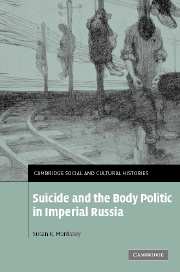Book contents
- Frontmatter
- Contents
- List of illustrations
- List of figures
- List of tables
- Acknowledgments
- Note on transliteration, translations, and dates
- List of abbreviations
- Introduction
- Part I Public order and its malcontents
- 1 Victims of their own will
- 2 Virtue and vice in an age of Enlightenment
- 3 The regulation of suicide
- 4 Punishing the body, cleansing the conscience
- 5 Policing and paternalism
- 6 Arbiters of the self: the suicide note
- Part II Disease of the century
- Part III Political theology and moral epidemics
- Epilogue
- Selected bibliography
- Index
2 - Virtue and vice in an age of Enlightenment
Published online by Cambridge University Press: 18 July 2009
- Frontmatter
- Contents
- List of illustrations
- List of figures
- List of tables
- Acknowledgments
- Note on transliteration, translations, and dates
- List of abbreviations
- Introduction
- Part I Public order and its malcontents
- 1 Victims of their own will
- 2 Virtue and vice in an age of Enlightenment
- 3 The regulation of suicide
- 4 Punishing the body, cleansing the conscience
- 5 Policing and paternalism
- 6 Arbiters of the self: the suicide note
- Part II Disease of the century
- Part III Political theology and moral epidemics
- Epilogue
- Selected bibliography
- Index
Summary
I can only say that Cato is of course greater than the convict who chooses to suffer and live, and that I am free to throw off the burden [of life] even if I can't pick it up again, especially as we are destined to drop it sooner or later anyway.
Mikhail Sushkov, Suicide Note, 1792This is the consequence of unbelief and debauchery! This is the fruit of the lack of restraint [neobuzdannost'] and of delusion!
I. Zavalishin, Letter to the Publishers of New Monthly Compositions, 1794When Mikhail Sushkov killed himself in the summer of 1792, he authored his death as a public statement: “My position has burdened me already for a long time,” he wrote, “but it has burdened me as a philosopher.” His act built upon three primary models. He acknowledged Goethe's notorious hero but denied too close a resemblance: “Perhaps even Werther helped me in part, but for God's sake, don't consider me an ape of Werther, still less insane.” He then cited a verse from his (then unpublished) epistolary tale, The Russian Werther, thereby linking himself to his own fictional hero. His second model was a materialist credo: even Voltaire, he ironically noted, had been unable to convince him of the immortality of the soul. Finally, because he did not have reason beyond the principle itself, Sushkov constructed his suicide as a rational and, as such, heroic act.
- Type
- Chapter
- Information
- Suicide and the Body Politic in Imperial Russia , pp. 47 - 76Publisher: Cambridge University PressPrint publication year: 2007

